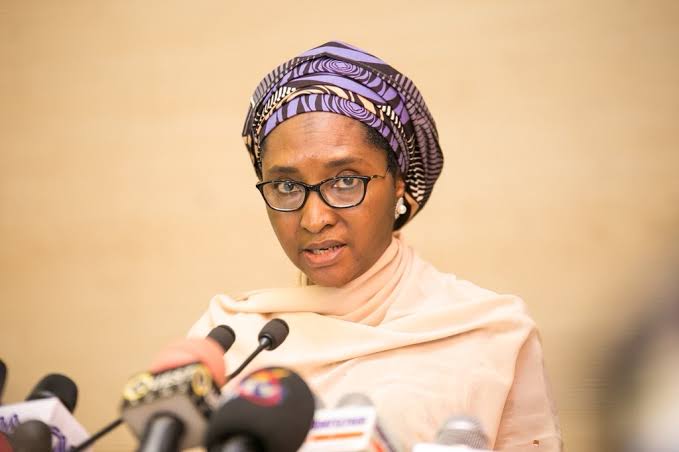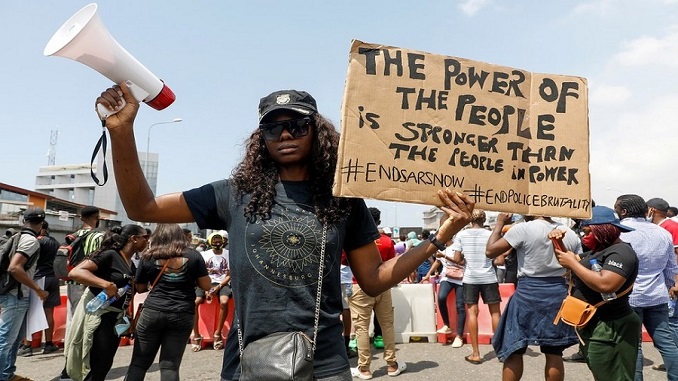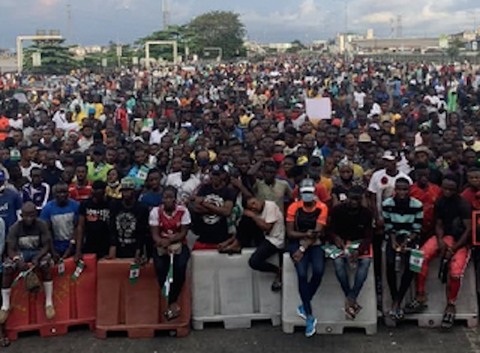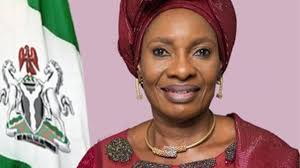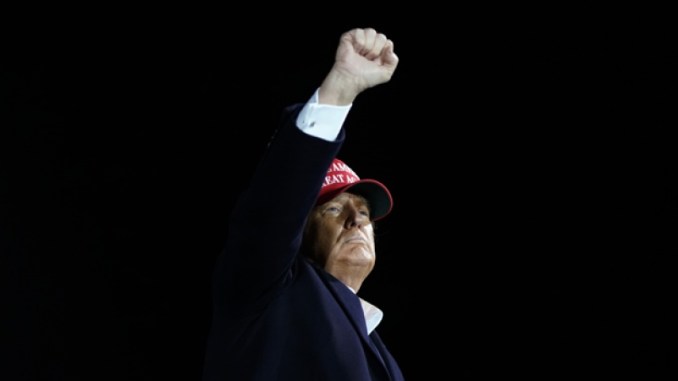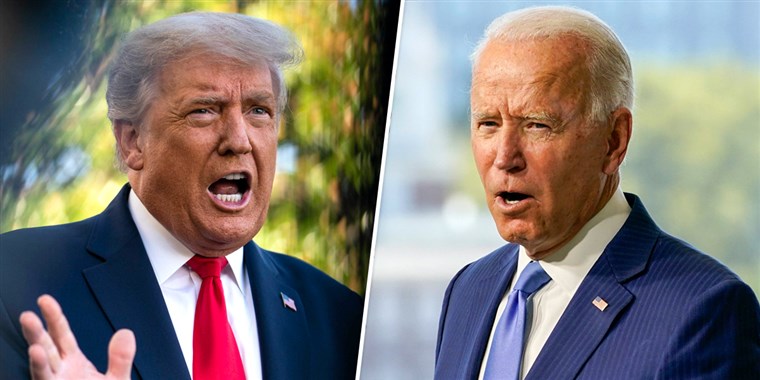- Calls on the government to be alive to its responsibilities to protect citizens
Condemnations continue to trail the continued harassment of #ENDSARS movement activists by agents of government, with NigerianWomenArise a group of Nigerian feminists, calling for the immediate return of Ms Modupe Odele’s international passport.
On the 3rd November 2020, Odele a US-trained Nigerian attorney and co-lead of ENDSARSLegal, an initiative which provided free legal aid to peaceful #ENDSARS protesters had her International passport confiscated by a member of the Nigerian Immigration Service.
The action has attracted a lot of outcry internationally and from a wide spectrum of Nigerians including civil society groups.
The NigerianWomenArise in a statement titled: “Feminist Womanifesto Group (#NigeranWomenArise) Condemns the Continued Harassment on Leaders of the #Endsars Protesters and Demands the Immediate Return of the International Passport of Ms Modupe Odele (MOE)” called on the Nigerian government to protect the freedom and rights of all citizens, including Ms. Odele.
The statement which was copied to the Senate President, Speaker of the House of Representatives, Chairmen of Governors’ Forum, the Executive Secretary, National Human Rights Commission, the British High Commissioner to the Federal Republic of Nigeria, German Ambassador to the Federal Republic of Nigeria, United States Ambassador to the Federal Republic of Nigeria, Swiss Ambassador to the Federal Republic of Nigeria, the United Nations High Commissioner for Human Rights and signed by the group’s lead Dr. Abiola Akiyode Afolabi along with about 159 other women reads:
“We, the undersigned, (#NigerianWomenArise) of the Feminist Womanifesto Group, condemn in strong terms the continued harassment on the #ENDSARS movement leaders. We, note with alarm that on 3rd November 2020, Modupe Chizoba Odele, a US-trained Nigerian attorney and the co-lead of ENDSARSLegal, an initiative which provided free legal to peaceful #ENDSARS protesters had her International passport confiscated by a member of the Nigerian Immigration Service.
“We strongly condemn the actions of the Immigration service, the Nigerian State Security Service (SSS) and by extension the Nigeria government in confiscating Ms. Odele’s passport.
“We urge the Nigerian government to protect the freedom and rights of all citizens, including Ms. Odele. As a Nigerian citizen, Section 41 of the Constitution guarantees Ms. Odele the right to move in and out of Nigeria; therefore, any restriction of her movement is illegal and wholly unconstitutional. In addition, although Section 5 of the Passport Act 1985 gives the Minister of Interior the power to cancel or withdraw a passport, the section also states clearly, the conditions for such a withdrawal. Unless the Minister has been furnished with confidential information duly communicated to Ms. Odele, we see no legal reason(s) why Ms. Odele’s passport should be confiscated. Suffice it to say, that such an act, is tantamount to intimidation and infringement of her rights, both of which not only contravene the provisions of the Constitution and could cause reputational damage to Nigeria, both at home and on the international gaze.
“We deplore, in the strongest terms, all acts of mental, emotional or physical intimidation towards the peaceful protesters, service providers for the protests, and members of the Feminist Coalition for exercising their right to peaceful protest, as accorded to every Nigerian, under Section 40 of the Nigerian Constitution. We strongly believe that Ms. Odele and others are being targeted for the role they played during the #ENDSARS protest, and take this time to remind Nigerians that we are in a democracy and citizens’ rights to express themselves through protest are guaranteed by the Constitution.
“We also use this opportunity to applaud the valorous actions of DJ Switch on that dreaded night now known as “Black Tuesday” and all the other young men and women for their courage and resilience. Our growing solicitude is further exacerbated by news that DJ Switch – Obianuju Catherine Udeh – is now believed to have been forced into hiding like a fugitive, and call on the government to be alive to its responsibilities to protect citizens.
“We demand that the Nigerian government put a stop to the harassment of the members of the Feminist Coalition, DJ Switch, and the peaceful #ENDSARS protesters and ensure their safety and protection of their rights as bestowed upon them as citizens of a democratic society by virtue of our constitution.
“The #NigerianWomenArise assures Nigerian youths of our absolute support and solidarity with their ENDSARS agitation and will do all that is necessary to help safeguard their right to peaceful protests. Nigerian Women will continue to closely monitor the events as they develop and will take appropriate measures to protect and defend our democracy for peace and justice to reign. May the souls of those who lost their lives due to law enforcement brutality before and during this protest rest in peace…”
Members of the Feminist Womanifesto Group are:
Abimbola Junaid Abiodun Essiet Abiola Akiyode Afolabi
Adaobi Egboka Adekemi Ndieli Adenike Grange
Adeola Awogbemi Aderonke Adesanya Aderonke Bello
Aderonke Ige Aderonke Imana Adetoun Ilumoka
Adiya Ode Agatha Osieke Aisha Haliru
Aishatu Ibrahim Kilishi Akinola Christiana Allisa Mimi
Amina Aliyu Amina Aliyu Adamu Amina Salihu
Amy Oyekunle Angela Odah Anne Adidu
Anne Ikpeme Anthonia Duru Anthonia Ojenagbon
Añuli Ola-Olaniyi Anuoluwapo Agbaje Ashley Dauda
Asmau Benzies Leo Ayisha Osori Ayisha Oyebode
Ayo Atsenuwa Ayodeji Osowobi Ayodele Olofintuade
Azeezat Olaoluwa Basirat Adesina Bella Anne Ndubuisi
Betty Abah Bimbo Oloyede Bisi Adeleye-Fayemi
Bisi Aina Blessing Digha Bola Akanji
Bose Ironsi Bukky Williams Bukola Onyishi
Bunmi Oyinsan Celine Okoro Chiedo Nwankwor
Chinelo Njemanze Chineme Ezekwenna Chinwe Onyeukwu
Chioma Agwuegbo Christiana Abayomi-Oluwole Constance Ogadimma Okeke
Constance Okeke Cynthia Mbamalu Daisy Funke
Debra Ode Doose Didi Dorcas Iorkusa
Dorcas Kwamande Dorothy Njemanze Dudu Manuga
Ebere Ifendu Ebi Emezue Ejiro Otive-Igbuzor
Ekaete Umoh Elizabeth Jeiyol Emem Otuoke
Ene Ede Enitan Okediji Esosa Edobor
Esther Eghobamen Esther Hindi Esther Olufunke
Evelyn Oti Evelyn Ugbe Ezinwa Okoroafor
Felicia Onibon Foluke Ademokun Fakhrriyah Hashim
Funke Akiyode Funke Ijayekunle Funke Oladipo
Funmi Para Mallam Funmilola Oyefusi Georgeleen Ekon
Geraldyn Debbie Gracy Mbah Hajara Adamu
Halima Abubakar Hansatu Adegbite Helen Tegtegh
Helen William Hellen Netugu William Ife Sarumi
Ifeyinwa Achike Iheoma obibi Ijeoma Jessica Uzoeshi
Ijeoma Thomas-Odia Inim Ufon Etuk Irene Ugbah
Irene Ugbah Ireti Disu Ireti Bakare-Yusuf
Itoro Anaba Ivy Odia Basil-Ofili Jite Phido
Joan Jummai Idonije Josephine Effah-Chukwuma Josephine Obinyan
Joy Lydia Joy Onyesoh Juliana Oyegun
Kadaria Ahmed Kate Banjoko Kate Omolola Banjoko
Kehinde Afolabi Kemi Akinremi Kemi Okeyondo
Kyauta Giwa Laila St. Daniels Lesley Agams
Ler Jonathan Lillian Okenwa Limota Goroso
Lois Auta Lois Chinedu Loretta Ofure Enofe-Laurel
Louisa Eikhomun-Agbonkhese Mabel Onwuemele Mabel. A. Ade
Mairo Mandara Mandy Asagba Manre Chirtau
Mariam Oyiza Mary Afan Mary Ekpere Eta
Mary Ikoku Mfon Usoro Mikang Longjan
Mirabel Edozie Miriam Menkiti Mojubaolu Olufunke Okome
Moremi Ojudu Motunrayo Mustapha Mufuliat Fijabi
Mutiat Oladejo Nana Tanko Ndodeye Bassey-Obongha
Ngozi Iwere Ngozi Juba Ngukwase Surma
Niri Goyit Nkechi Ilochi-Omekedo Nkechi Obiagbaoso-Udegbunam
Nnenna Anozie Oby Ezekwesili Ogechi Hepzibah Ikeh
Ogechi Ikeh Oguadimma ijeoma joy Ojobo Atuluku
Okiemute Olori Olakitan Wellington Olanike Shobajo
Olayinka Babalola Oluchi Okpechi Olufunke Baruwa
Oluwafunmilayo Para-Mallam Oluwatobi Ayodele Oluwatoni Adeleke
Omekedo Oby Omolayo Ojo Onyema Afulukwe
Onyinyechi Ogadinma Nwachukwu Oredola Kayode-Sanni Osai Ojigho
Osasumwen Edobor Pamela Osakwe Patricia Donli
Peyi S Soyinka-Airewele Princess Hamman-Obels Princess Olufemi-Kayode
Priscilla M Achakpa Priscilla Usibaifo Queency Patrick
Rahmat Abisola Abdullahi Ramat Abdullahi Ramatu Bako
Rhoda Prevail Tyoden Roibito Ekpiken-Ekanem Rose Gyar
Sola Folayan Subomi Chuku Sumbo Odebode
Suwaiba Yakubu Jibrin Temilola George Terfa Suswam
Theopile Madu Titilayo Owolabi Akerele Titilola V Adeniyi
Toni Adeleke Uche Hilary-Ogbonna Uche Nwokedi
Vicky Sylvester Victoria Bassey Victoria Emah-Emah
Violet Ochekwu Vivian Efem-Bassey Wumi Asubiaro Dada
Yemi Adamolekun Yinka Omorogbe Yinka Shokunbi”
Zarah Ahmad

